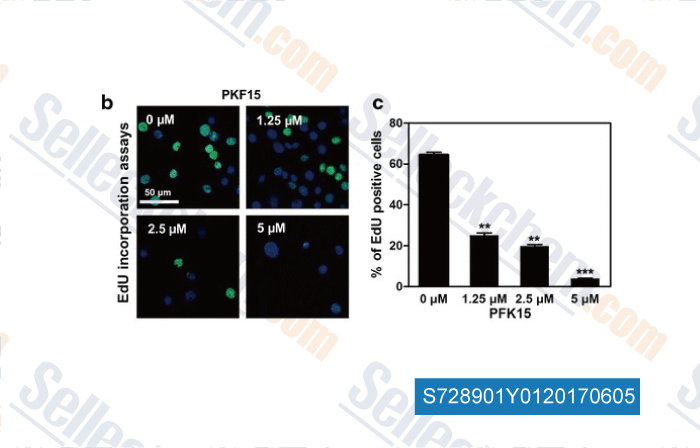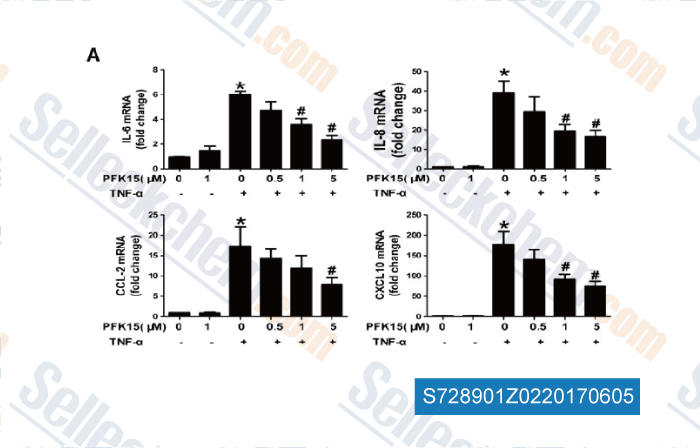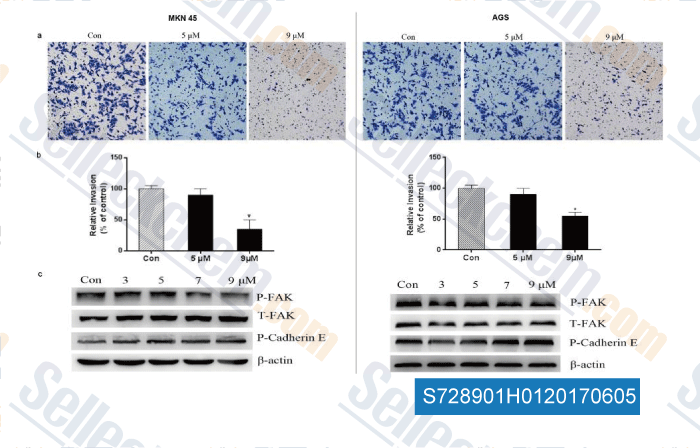|
How to Cite 1. For In-Text Citation (Materials & Methods): 2. For Key Resources Table: |
||
|
Toll Free: (877) 796-6397 -- USA and Canada only -- |
Fax: +1-832-582-8590 Orders: +1-832-582-8158 |
Tech Support: +1-832-582-8158 Ext:3 Please provide your Order Number in the email. We strive to reply to |
Technical Data
| Formula | C17 H12 N2 O |
||||||||||||||
| Molecular Weight | 260.29 | CAS No. | 4382-63-2 | ||||||||||||
| Solubility (25°C)* | In vitro | DMSO | 19 mg/mL (72.99 mM) | ||||||||||||
| Ethanol | 5 mg/mL (19.2 mM) | ||||||||||||||
| Water | Insoluble | ||||||||||||||
| In vivo (Add solvents to the product individually and in order) |
|
||||||||||||||
|
* <1 mg/ml means slightly soluble or insoluble. * Please note that Selleck tests the solubility of all compounds in-house, and the actual solubility may differ slightly from published values. This is normal and is due to slight batch-to-batch variations. * Room temperature shipping (Stability testing shows this product can be shipped without any cooling measures.) |
|||||||||||||||
Preparing Stock Solutions
Biological Activity
| Description | PFK15 (PFK-015) is a potent and selective 6-phosphofructo-2-kinase (PFKFB3) inhibitor with IC50 of 207 nM. | ||
|---|---|---|---|
| Targets |
|
||
| In vitro | PFK15 produces potent growth inhibition in a series of cancer cells. In Jurkat T-cell leukemia cells and H522 lung adenocarcinoma cells, this compound also reduces F26BP, glucose uptake, and intracellular ATP level. | ||
| In vivo | In vivo, PFK15 has adequate pharmacokinetic properties. This compound (25 mg/kg i.p.) suppresses the growth, metastatic spread, and glucose metabolism of LLC tumors in syngeneic mice. In three human xenograft models of cancer in athymic mice, it also yields antitumor effects that are comparable to approved chemotherapeutic agents. |
Protocol (from reference)
| Kinase Assay: |
|
|---|---|
| Cell Assay: |
|
| Animal Study: |
|
References
|
Customer Product Validation

-
, , J Exp Clin Cancer Res, 2017, 36(1):7

-
Data from [ , , Br J Pharmacol, 2017, 174(9):893-908 ]

-
Data from [ , , PLoS One, 2016, 11(9):e0163768 ]
Selleck's PFK15 Has Been Cited by 34 Publications
| Transient APC/C inactivation by mTOR boosts glycolysis during cell cycle entry [ Nature, 2025, 10.1038/s41586-025-09328-w] | PubMed: 40739344 |
| Immunosuppressive Formulations for Immunological Defense against Traumatic Brain Injury [ Adv Healthc Mater, 2025, e2501417.] | PubMed: 40437894 |
| Vitamin D impedes eosinophil chemotaxis via inhibiting glycolysis-induced CCL26 expression in eosinophilic chronic rhinosinusitis with nasal polyps [ Cell Commun Signal, 2025, 23(1):104] | PubMed: 39985085 |
| Live-cell metabolic analyzer protocol for measuring glucose and lactate metabolic changes in human cells [ STAR Protoc, 2025, 6(1):103518] | PubMed: 39799573 |
| Identification of PFKFB3 as a key factor in the development of colorectal cancer and immunotherapy resistance [ Clin Exp Med, 2024, 24(1):219] | PubMed: 39261380 |
| Multi-omics and immunogenomics analysis revealed PFKFB3 as a targetable hallmark and mediates sunitinib resistance in papillary renal cell carcinoma: in silico study with laboratory verification [ Eur J Med Res, 2024, 29(1):236] | PubMed: 38622715 |
| Human blood vessel organoids reveal a critical role for CTGF in maintaining microvascular integrity [ Nat Commun, 2023, 14(1):5552] | PubMed: 37689702 |
| Human blood vessel organoids reveal a critical role for CTGF in maintaining microvascular integrity [ Nat Commun, 2023, 14(1):5552] | PubMed: 37689702 |
| Arginine methylation of PPP1CA by CARM1 regulates glucose metabolism and affects osteogenic differentiation and osteoclastic differentiation [ Clin Transl Med, 2023, 13(9):e1369] | PubMed: 37649137 |
| Arginine methylation of PPP1CA by CARM1 regulates glucose metabolism and affects osteogenic differentiation and osteoclastic differentiation [ Clin Transl Med, 2023, 13(9):e1369] | PubMed: 37649137 |
RETURN POLICY
Selleck Chemical’s Unconditional Return Policy ensures a smooth online shopping experience for our customers. If you are in any way unsatisfied with your purchase, you may return any item(s) within 7 days of receiving it. In the event of product quality issues, either protocol related or product related problems, you may return any item(s) within 365 days from the original purchase date. Please follow the instructions below when returning products.
SHIPPING AND STORAGE
Selleck products are transported at room temperature. If you receive the product at room temperature, please rest assured, the Selleck Quality Inspection Department has conducted experiments to verify that the normal temperature placement of one month will not affect the biological activity of powder products. After collecting, please store the product according to the requirements described in the datasheet. Most Selleck products are stable under the recommended conditions.
NOT FOR HUMAN, VETERINARY DIAGNOSTIC OR THERAPEUTIC USE.
